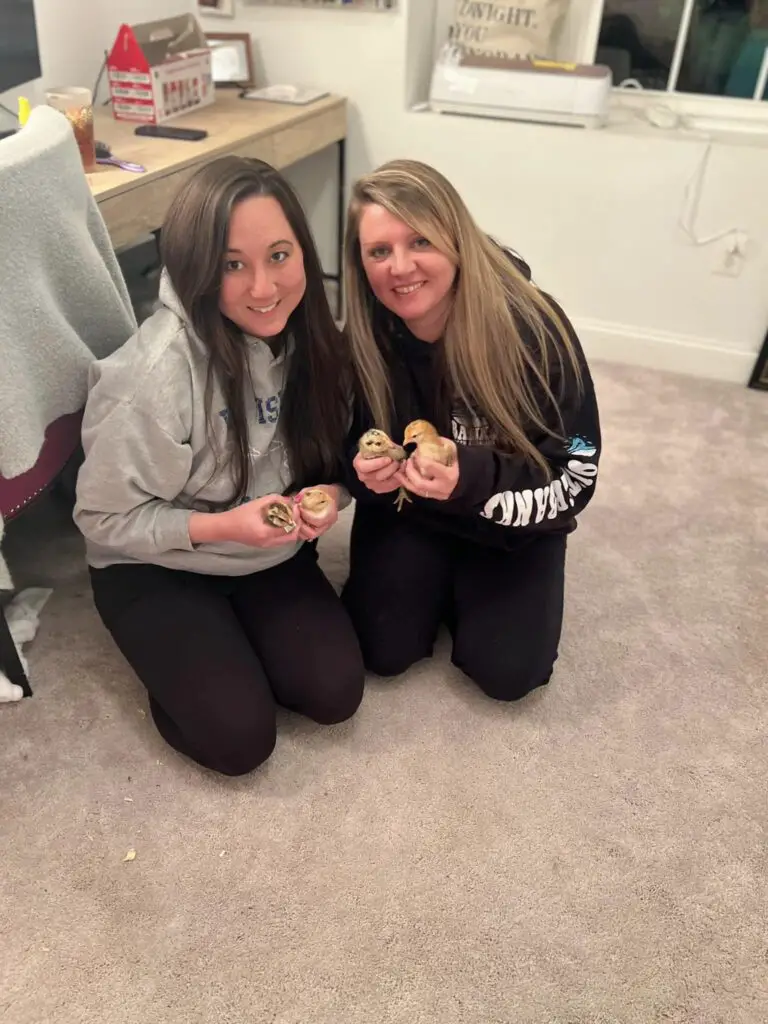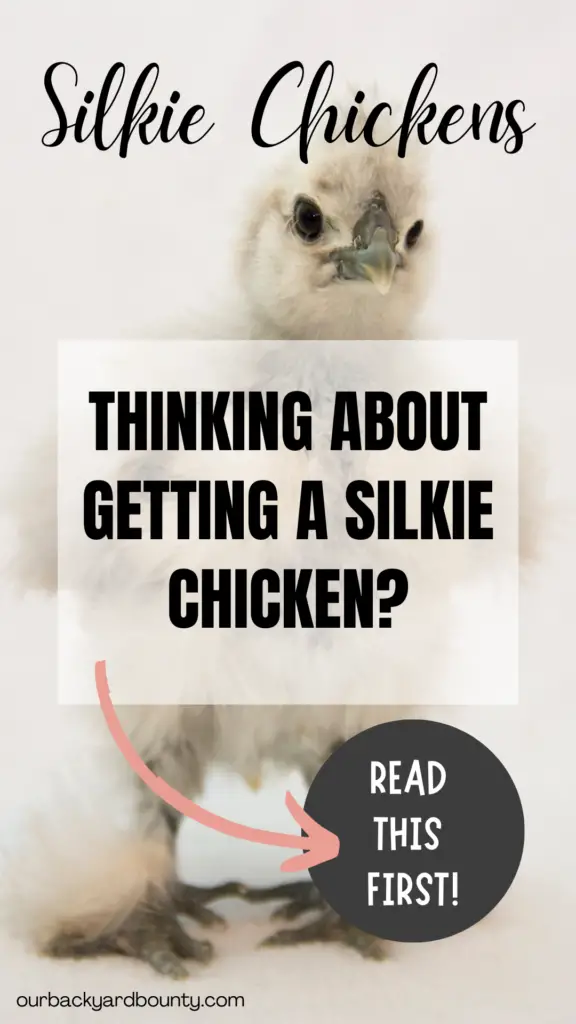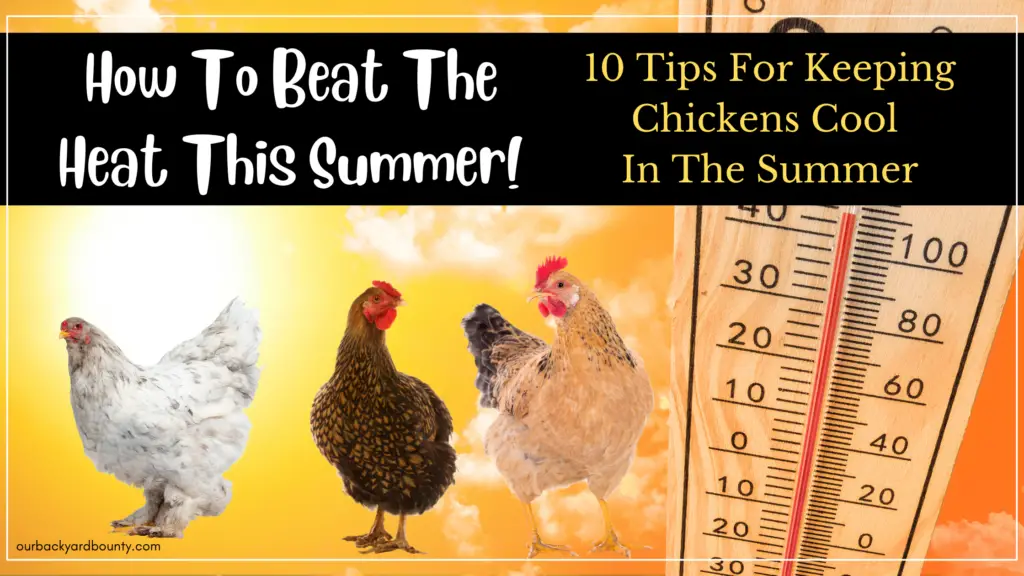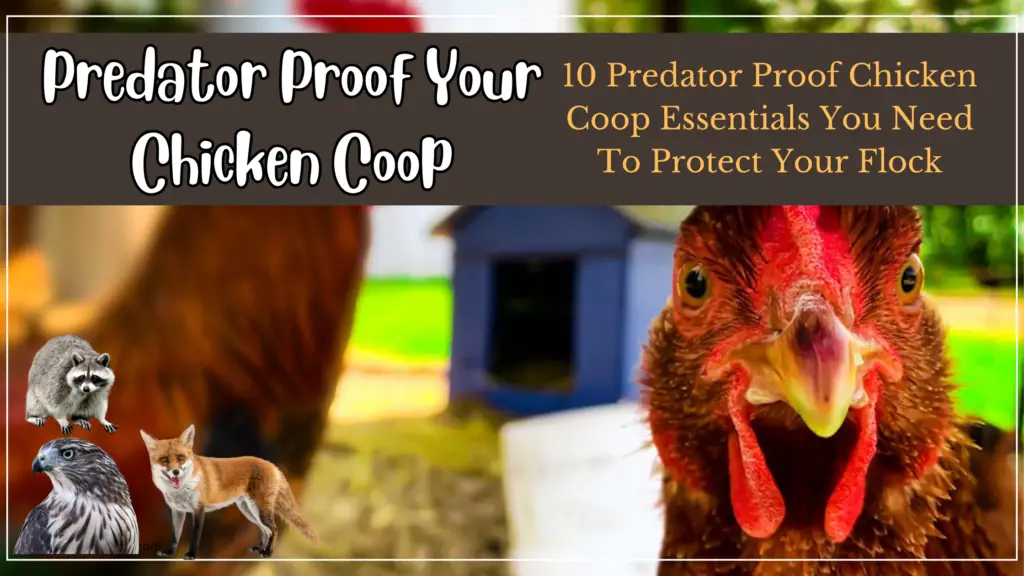This post is all about silkie chickens.

Follow Us On Tik Tok and Instagram!
As a means for providing for my family, I may earn commissions if you shop through the links on this page at no additional cost to you. Thank you!
Everything You Need To Know About Silkie Chickens
Do you find yourself daydreaming about owning an eccentric pet that stands out from the typical dog or cat? Imagine a fluffy ball of fur wandering around your backyard, pecking at the grass and cooing softly. You may have never heard of them before, but Silkie Chickens are becoming increasingly popular as backyard pets for their unique appearance and gentle nature. In fact, according to the American Poultry Association, Silkie Chickens are the fastest growing breed in the poultry industry. But what makes these birds so special?
LEARN MORE ABOUT THE 8 BEST CHICKEN BREEDS FOR BEGINNERS
The History Of Silkie Chickens
Silkie chickens, known for their unique appearance and gentle demeanor, have a rich history steeped in myth and legend. They are believed to have originated in China during the Han dynasty, around 2000 years ago. Silkies were initially prized as ornamental birds rather than for their egg or meat production. Their distinctive features, including their fluffy plumage, black skin, and blue earlobes, fascinated both Eastern and Western cultures.
Silkies made their way west via the Silk Road, where they quickly gained popularity for their charming appearance and gentle nature. They were first documented in Europe in the early 17th century, and by the 19th century, they had become established in the United States. Despite their diminutive size and limited egg-laying capabilities compared to other breeds, Silkies continued to captivate breeders and fanciers alike. Today, Silkies are cherished for their docile temperament, making them popular choices as pets and show birds. Their enigmatic history and distinctive characteristics ensure that Silkies remain a beloved and iconic breed in the world of poultry.

Physical Traits
Silkie chickens are renowned for their very unique appearance, setting them apart from other chicken breeds. One of their most distinguishing features is their fluffy plumage. It lacks the barbicels that typically hold feathers together, giving them a soft and silk-like texture. This characteristic gives Silkies a distinctive appearance, almost resembling fluffy clouds or tufts of cotton. Their feathers lack the hard, glossy sheen found in most chicken breeds, contributing to their distinctively soft and downy appearance.
Adding to their charm are Silkies’ other physical attributes, including their black skin and bones, blue earlobes, and turquoise-colored eyes. These features contrast strikingly with their fluffy white, black, blue, or buff-colored feathers, creating a visually captivating bird. Silkies also possess a distinctive crest of feathers on their heads, which further enhances their unique appearance. Overall, the combination of their soft, fluffy plumage, unusual coloring, and charming features make Silkies one of the most instantly recognizable chicken breeds in the world.
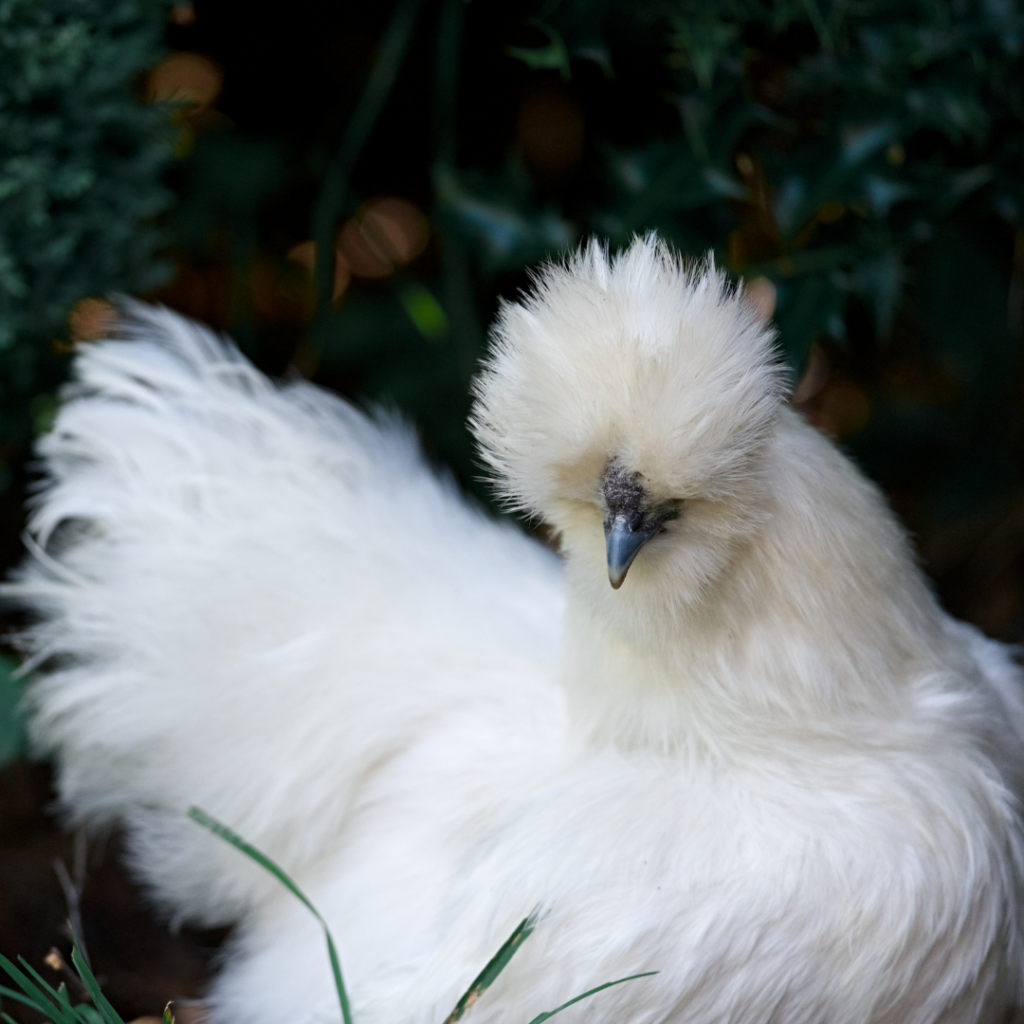
Personality
Silkie chickens are renowned not only for their adorable appearance but also for their gentle and docile personalities. Unlike some other chicken breeds known for their skittishness or aggressiveness, Silkies are famously calm and friendly, making them ideal companions for both adults and children. Their gentle demeanor and tolerant nature make them well-suited for interaction and handling. In fact, they often ENJOY human company and affection. Silkies are known to form strong bonds with their human caretakers, eagerly seeking out attention and companionship.
Despite their small size, Silkies possess a surprising amount of confidence and curiosity. You may often find them exploring their surroundings with an inquisitive spirit. Silkies are known to be sociable and enjoy the company of other birds, often forming tight-knit flocks. Silkies are also known to be nurturing and protective mothers, exhibiting a strong maternal instinct when caring for their chicks. Overall, the gentle and sociable personality of Silkies makes them a cherished addition to any flock or household.

Egg Production
Silkie chickens are not typically bred for high egg production like some commercial breeds; instead, they are prized more for their unique appearance and gentle disposition. While Silkies do lay eggs, their production is generally modest compared to other chicken breeds. On average, a Silkie hen may lay around 100 to 120 smaller-sized eggs per year. However, this can vary depending on factors such as genetics, diet, and environmental conditions. Their eggs are typically tinted in color and smaller in size compared to those of larger breeds, making them a charming addition to your egg basket.

Overall Health
Silkie chickens are generally robust birds, but they are known to be more susceptible to certain health issues compared to other chicken breeds. One of the most significant concerns for Silkie chickens is their vulnerability to respiratory problems. Their fluffy feathers can sometimes obstruct their vision and respiratory passages, leading to an increased risk of respiratory infections. It’s essential for Silkie owners to provide proper ventilation in their coops and to keep bedding clean to minimize the risk of respiratory issues. Additionally, Silkie chickens should be protected from drafts and damp conditions, which can exacerbate respiratory problems.
Another health concern for Silkies is their increased susceptibility to Marek’s disease. Marek’s disease is a highly contagious viral illness that affects the nervous system and can be fatal. Preventative measures such as vaccination, biosecurity protocols, and regular health checks can help mitigate these risks.
Despite these potential health challenges, with proper care and management, Silkies can lead long, healthy lives as cherished members of the flock.
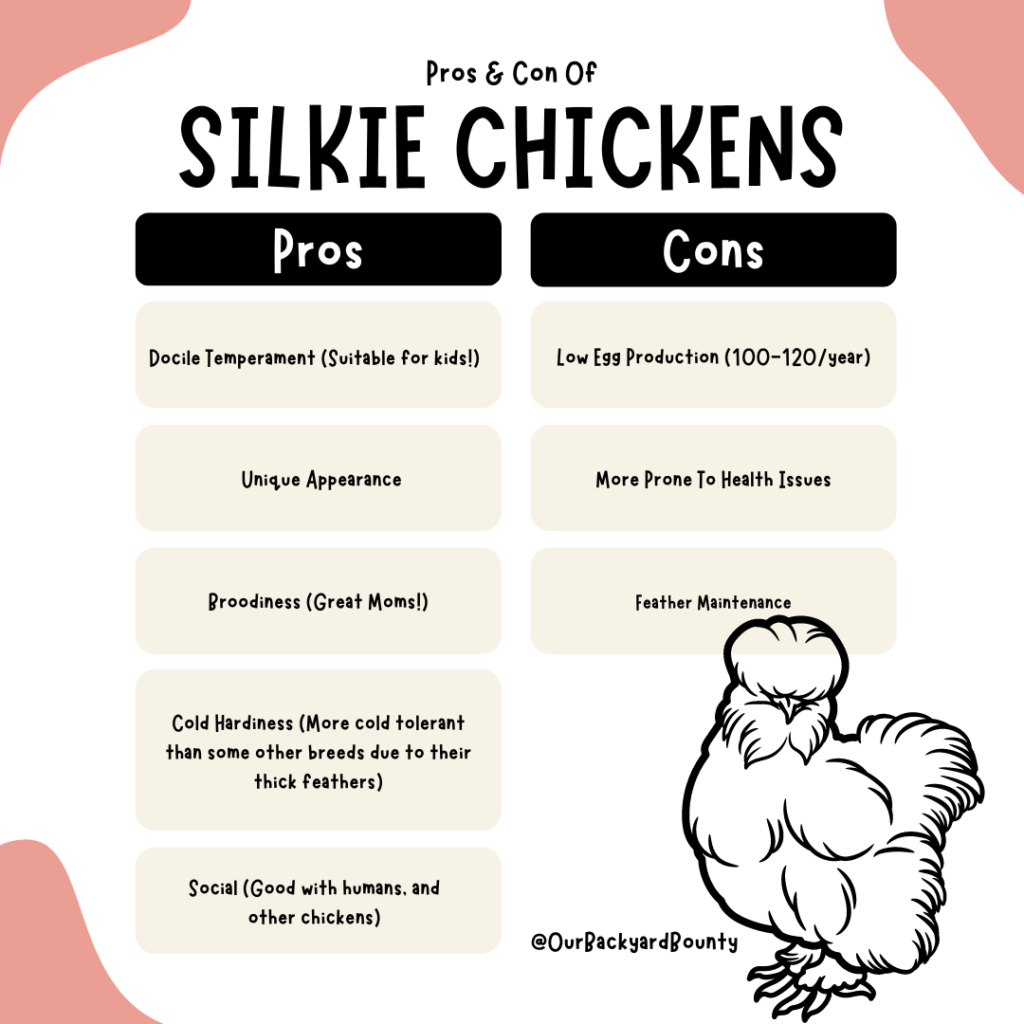
Silkie chickens stand out as not only a visually captivating breed but also as delightful companions. Their gentle demeanor, appearance, and unique characteristics make them a beloved choice for both novice and experienced chicken keepers. While they may not excel in egg production or meat yield, their charm and personality compensate for any shortcomings. From their fluffy feathers to their sociable nature, Silkies bring joy and companionship to those who welcome them into their flocks. Whether kept for their beauty, broodiness, or simply as feathered friends, Silkie chickens continue to captivate hearts around the world!
Best Selling Books On Silkie Chickens
- Hardy, Danielle Lynn (Author)
- Ph.D. ABA Judge and Tony L. Davis Jeff Duguay (Author)
CHECK OUT MORE RECENT POSTS!
15 Thoughtful Gifts For Gardeners To Grab Now
This post is all about gifts for gardeners. Best Gifts For Gardeners If you’re looking…
8 Best Companion Plants For Green Beans For Big Harvests
This post is all about companion plants for green beans. If you’re growing green beans…
The Best Companion Plants for Tomatoes (And What to Avoid)
This post is all about best companion plants for tomatoes. Best Companion Plants For Tomatoes…
10 Herbs To Plant Around Your Chicken Coop – & Why!
This post is all about what herbs to plant around your chicken coop. Best Herbs…
How To Keep Chickens Cool In The Summer Heat – 10 Game Changing Hacks
This post is all about how to keep chickens cool in the summer. Ways To…
10 Best Predator Proof Chicken Coop Essentials
This post is all about predator proof chicken coop essentials. Predator Proof Chicken Coop Essentials…
What You’ll Find Here
Are you eager to embrace the homesteading lifestyle, but worried about not having enough land? Fear not, for you don’t need vast acres to become a mini homesteader. With a little creativity and effort, you can transform your backyard into a thriving homestead, complete with chickens and a garden. Imagine the satisfaction of growing your own food and using it to whip up delicious, healthy meals. And if you’re ready to take the plunge and raise backyard chickens, you’ve come to the right place. This is where we’ll guide you through the world of modern homesteading.
Follow Us On Tik Tok and Instagram!
